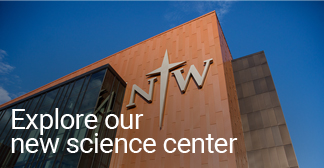Northwestern professors published in academic journal
Wednesday, May 11, 2016
Four Northwestern College professors have published essays in the May/June issue of Perspectives: A Journal of Reformed Thought. The issue focused on the relationship between science and the Christian faith.
Dr. Sara Sybesma Tolsma, professor of biology and co-editor of the journal, wrote “Integrating Science and Faith,” which challenges the belief held by 59 percent of Americans that science and faith are often in conflict with each other. In her essay, Tolsma argues that not only is it possible for science and faith to coexist harmoniously, but also that the pursuit of scientific inquiry is an opportunity to understand more deeply the creativity, the complexity—and even the mystery—of God’s activities.
“As a lifelong Christian and a scientist, I find that science and Scripture complement one another and, when integrated, affirm the truth I find in both,” writes Tolsma. “A worldview that pits science against faith as enemies in conflict is not fruitful or necessary, because science viewed through the lens of faith declares the glory of God.”
Ecology professor Dr. Laura Furlong’s essay, “For I Am Convinced,” describes her journey as a college student and the challenges she faced reconciling her maturing Christian faith with her development as a scientist. Now, as a professor at a Christian college, Furlong feels she has a responsibility to prepare her students to tackle tough questions and trust that diligent scientific inquiry will lead them to a deeper appreciation of their creator.
“No student should fear losing his or her faith as a result of honest inquiry into the two ‘books’ we’ve been given: Scripture and creation,” writes Furlong. “As a professor at a Christian institution, I have a duty and a privilege to model faithful learning and to encourage students to ask their own hard questions.”
“Let Us Behold” by biology professor Dr. Byron Noordewier was also published in the journal. In his essay, Noordewier argues that because one attribute of God is his enduring faithfulness and desire to have a relationship with us, we need not fear what we might learn about God by studying his world with an open mind. “What we discover in the study of his creation is that which he placed there for us to discover that we might know him,” writes Noordewier. “Our beholding is something to build our faith, not something to test our faith.”
Noordewier argues that if God has given us both his word and his world to help us understand him as creator, sustainer and savior, then we should prioritize and pursue each avenue of inquiry—both the study of science and the study of Scripture—with equal enthusiasm and openness to the truths God might reveal.
Dr. James Mead, professor of religion, published “Genesis 1 Within the Faith-Science Debate.” Mead argues that when the theological intent and literary artistry present in the first chapter of Genesis are taken into account, one might understand how unnecessary the debate between science and faith really is. “Those arguments have reduced its value to matters of chronology and cosmology, thereby obscuring its revelation of the majesty and glory of God,” says Mead.
Mead also suggests that Genesis 1 might not be interpreted in either a completely literal, narrative-historical sense or in a completely figurative, poetical-theological sense. Instead, he urges reading Genesis 1 with a spirit of discovery and awe: “This incredible prologue to Holy Scripture joyfully invites us to worship God as a good creator, to accept God’s purpose for humankind as earth’s stewards, and to affirm the equality of men and women and all races before God,” writes Mead.
Dr. Jason Lief, who will join Northwestern’s religion department next fall, is also published in Perspectives. A 1996 graduate of Northwestern College, Lief currently serves as an associate professor of theology at Dordt College, in addition to being co-editor of the journal. His essay, “The Rocks and Colliding Black Holes Cry Out,” was written in response to an eighth-grade student’s seemingly innocent question about whether or not Adam and Eve had belly buttons.
“I don’t really care about belly buttons; I do care that young people come to recognize that faith and science do not have to be in conflict,” writes Lief. “Often the problem is that we think we know what Scripture says, only to be surprised again and again when we actually read it.” Lief’s essay expressed a desire for his children to recognize that God loves creation, not just for what it provides for human beings, but because it is God’s good creation.
Perspectives is an academic journal with the purpose of expressing the Reformed faith theologically; engaging issues that Reformed Christians meet in personal, ecclesiastical and societal life; and contributing to the mission of the church of Jesus Christ. Six issues are published each year and can be accessed online at perspectivesjournal.org.

